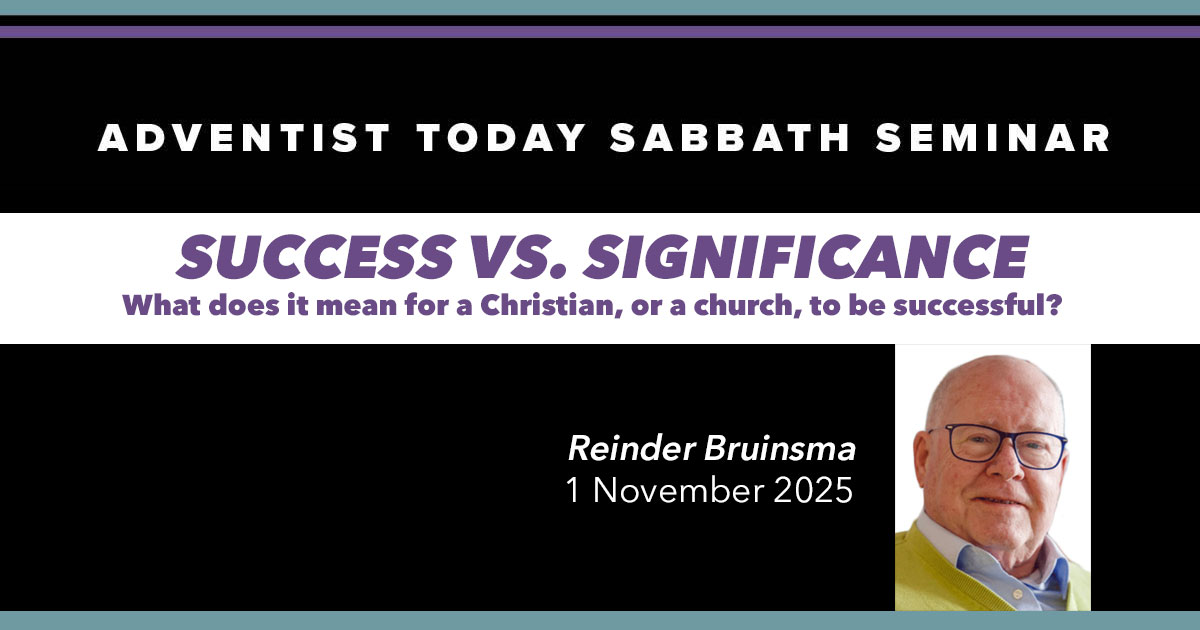Acacia wood built God’s tabernacle. Today, He calls us to be His living dwelling, reflecting Jesus to the world. Source: https://www.youtube.com/shorts/Vk3rJ7mLx-I
Thousands of Pastors Celebrate Certification Milestone in Territory-Wide Event
Seventh-day Adventist district pastors across the Inter-American Division (IAD) celebrated the culmination of this year’s territory-wide certification training program on Oct. 29, 2025. The annual online event was part of an ongoing initiative d… Source: https://adventist.news/news/thousands-of-pastors-celebrate-certification-milestone-in-territory-wide-event
ATSS: Reinder Bruinsma, “Success vs. Significance: What does it mean for a Christian—or a church—to be successful?”

29 October 2025 | Every Adventist knows that when the church is asked for its metrics of success, it will default to these things: Money—tithe and offerings Numbers—baptisms, members, and congregations. Individuals, too, evaluate their own success—often by metrics such as prosperity and status. In this class we will look at the difference between significance […] Source: https://atoday.org/atss-reinder-bruinsma-success-vs-significance-what-does-it-mean-for-a-christian-or-a-church-to-be-successful/
Les AA et Al-Anon détiennent-ils les secrets d’une meilleure église adventiste?

par Shelley Curtis Weaver | 30 octobre 2025 | Chaque fois que je discute avec des adventistes qui ont participé à des groupes de rétablissement en 12 étapes, ils me disent presque toujours: «J’aimerais que mon église ressemble davantage à mon groupe en 12 étapes.» Lorsque j’ai commencé à assister aux réunions de rétablissement en […] Source: https://atoday.org/les-aa-et-al-anon-detiennent-ils-les-secrets-dune-meilleure-eglise-adventiste/
Miracles in Motion
If you follow world events, you know Jesus is coming soon—because the devil is hard at work! That’s why we at Adventist World Radio love to share the good news. God’s Spirit is also hard at work, calling people from all walks of life to take a stand for Jesus—and this year has been one miracle after another! Below is a short video where we share some of the highlights of what God is doing through the ministry of Adventist World Radio. It may not make headline news, but we know it’s breaking news in heaven. Take a few moments to watch this brand-new report. You’ll be inspired. We love to see lives changed for God’s kingdom, and we especially love it when He uses Adventist World Radio to do it! In Christian love, Jim Howard
President MB01OZSYXAVSLHI Source: https://www.youtube.com/watch?v=H5TOHExq3F0
News from The Philippines, Ireland, Papua New Guinea, and Southern Adventist University

30 October 2025 | News from the Philippines “The Philippine Publishing House (PPH) unveiled its wall of gratitude on October 15 at the prayer garden of its Silang campus, commemorating individuals and institutions who supported the publishing house’s successful relocation in 2022. The wall, composed of blue, gray, and white hexagonal acrylic plates illuminated by […] Source: https://atoday.org/news-from-the-philippines-ireland-papua-new-guinea-and-southern-adventist-university/
SATIRE: Adventists Told to Run Every Social Media Post by GC Before Publishing

BREAKING: The General Conference (GC) has just announced that all Adventist social media posts must now be pre-approved by an official GC committee before being published. According to the new “Digital Purity Policy,” every post, story, meme, and comment will go through a rigorous 28-step doctrinal verification process—including a subcommittee on tone, modesty, and emoji […] Source: https://atoday.org/satire-adventists-told-to-run-every-social-media-post-by-gc-before-publishing/
God First: Your Daily Prayer Meeting #1161
"If you believe, you will receive whatever you ask for in prayer" (Matthew 21:22, NIV).
Tag someone in need of prayer, and kindly share your prayer requests here:
https://wkf.ms/3DBuapQ Source: https://www.youtube.com/watch?v=qbDG0DUs9_E
The Radio That Changed My Life
Through Nuevo Tiempo Radio, Marlene learned how to pray and surrender both her life and her daughters’ lives into God’s hands. Prayer transformed her pain into peace and gave her strength to worship and serve Him with all her heart. Today, she shares this radio station everywhere she goes, so others may find the same hope. Discover how God is changing lives through Adventist World Radio at https://awr.org. Watch Marlene’s full story here: https://youtube.com/watch?v=E9wQwYAs1Ro #AWR360 #BroadcastToBaptism Source: https://www.youtube.com/shorts/KLY0RVHUFQw
Retired Nurse Builds 12 Seventh-day Adventist Churches in Angola
The Seventh-day Adventist Women’s Ministry of the Southwest Angola Union, an administrative territory of the Southern Africa-Indian Ocean Division, celebrated its 30th anniversary through a spiritual retreat in the municipality of Gangula from Oct… Source: https://adventist.news/news/retired-nurse-builds-12-seventh-day-adventist-churches-in-angola
- « Previous Page
- 1
- …
- 154
- 155
- 156
- 157
- 158
- …
- 4844
- Next Page »

